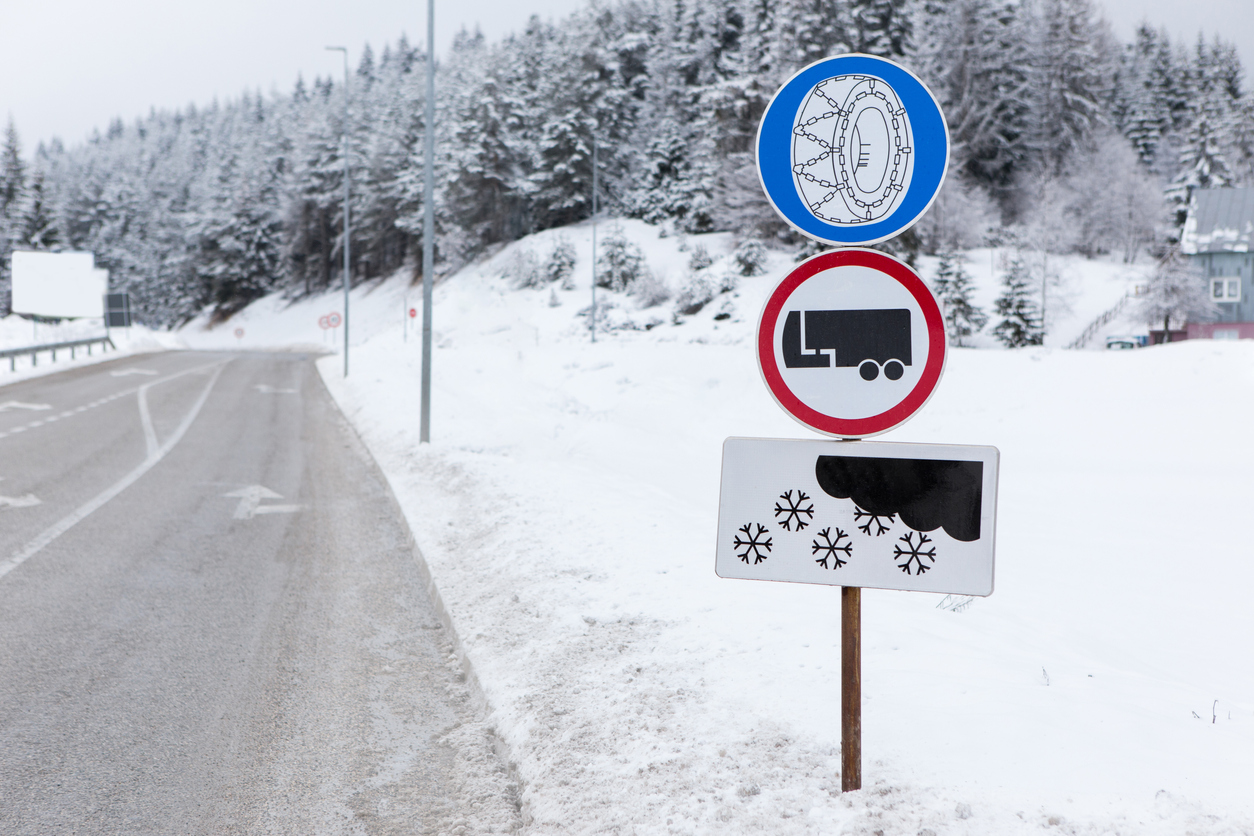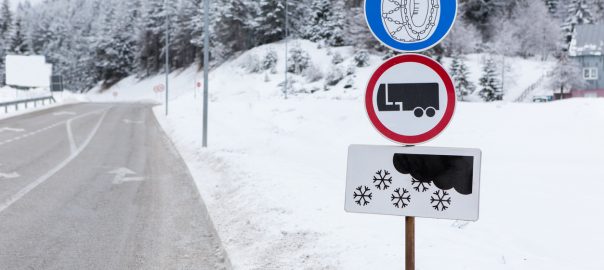When winter weather occurs, it can be confusing when you should chain your tires. During September 1st and May 1st, each state will have its own set of rules for snow chains. No matter which route you take, you must stay compliant with the state’s laws to avoid receiving a fine ranging from $50 to $500.

When winter weather occurs, it can be confusing when you should chain your tires. During September 1st and May 1st, each state will have its own set of rules for snow chains. No matter which route you take, you must stay compliant with the state’s laws to avoid receiving a fine ranging from $50 to $500.
Snow Tire Chain Alternatives
When looking for snow chains for your truck, other alternative options may be more feasible for your pocketbook and less time to put on and take off. Below are some different alternatives to snow tire chains.
Autosock
Autosock is a cloth cover that goes over your tires. By using Autosock, this could help increase traction during icy and snowy weather conditions. The Autosock is a smooth fit, and it much quieter than actual snow tire chains. They are also easy to put on and remove, saving you time.
Flex-Tax SnoClaws
Flex-Trax is the manufacture for SnoClaws, which are rubber made wraps that go around your tire and secure together with a plastic strap. One benefit of having SnowClaws for your tires is that you can install these devices without having to move your truck. While AutoSocks are lighter than a snow chain, SnoClaws are easier to put on and take off.
TruckClaws
TruckClaws are typically used in emergencies. In case you become stuck in the ice, snow or mud and need to get out, TruckClaws are a great device to have in your truck. TruckClaws are similar to a metal cleat with straps and a ratchet that can be placed around the tire. TruckClaws are easy to install and typically take a few minutes once placed in the right spot. You can install TruckClaws over your already installed traction device, such as snow chains. Since TruckClaws do not replace snow chains, this device can be helpful when you need to get out of tight spots that a snow chain cannot do.
Truck Snow Tire Chain Laws per State
The following states only require tire chains when safety conditions are present, such as ice, snow, or any other road condition that could cause a vehicle to skid or slide:
- Alabama
- Arizona
- Arkansas
- Illinois
- Indiana
- Iowa
- Kansas
- Louisiana
- Maine
- Maryland
- Massachusetts
- Minnesota
- Mississippi
- Missouri
- Nebraska
- New Hampshire
- New Jersey
- New Mexico
- New York
- North Carolina
- North Dakota
- Ohio
- Oklahoma
- Oregon
- Pennsylvania
- Rhode Island
- South Carolina
- South Dakota
- Tennessee
- Texas
- Vermont
- Virginia
- West Virginia
- Wisconsin
Alaska – May 1st – September 15th drivers are required to have chains when traveling north of 60 North Latitude.
April 15th – September 30th drivers are not required to have chains when traveling south of 60 North Latitude.
May 1st – September 15th drivers are not required to have chains when traveling Sterling Highway.
When using chains in these areas, you will be required to gain a special permit from the Department of Administration.
California – Drivers are not required to have tire chains during any specific time. However, when severe winter weather occurs, some traction chain requirements must be met. When these requirements take effect, you will notice signs along the highways. These signs include:
- R1: Chains or snow tires on drive axle vehicles apart from four-wheel or all-wheel drive vehicles.
- R2 Chains are required on all vehicles apart from four-wheel and all-wheel vehicles which have snow-tread tires on all wheels.
- Chains are required on all vehicles with no exceptions.
Colorado – September 1st – May 31st all trucks are required to have chains when traveling I-70 between mile markers 259 and 133. There are fines of $50 and a $16 surcharge if you are caught without chains.
If you do not have chains on your vehicle when this law goes into effect, you could be fined $500 with a $78 surcharge. If you are blocking the highways due to not having chains on, you can be fined $1,000 with a $156 surcharge.
Colorado chain laws include
- Level 1: All single-axle combination vehicles are required to have chains. Trucks are required to have chains on all four tires. During Level 1, other commercial vehicles are required to have chains or snow tires.
- Level 2: During Level 2, commercial vehicles are required to have chains on all four tires.
Delaware – October 15th – April 15th drivers are required to have chains on all tires.
Georgia – When the Georgia Department of Transpiration closes highways or only allows limited access because of severe weather, signs will be placed to inform drivers that chains are required. For all commercial vehicles, chains are required on the outer drive tires.
Idaho – When the Idaho Department of Transportation deems the Lookout Pass, and Fourth of July Pass on I-90 is unsafe for travel, drivers will be required to have chains on at least one tire on each axle and one axle near the rear of the vehicle.
Kentucky – Drivers are not allowed to enter the icy roadways with chains on their tires unless the wheel rests on an ice-shoe that is 6 inches wide. In the case chains are used, cross chains cannot be more than ¾ inches thick and should be spaced 10 inches apart around the tire.
Michigan – Chains are only required when ice, snow, or other winter weather is present. However, when chains are being used, the chain cannot come in direct contact with the roadways.
Montana – When the Montana Department of Transportation announces roadways are dangerous for travel because of winter weather there are come requirements drivers must meet:
- Chains are required for all drive wheels
- Chains or traction devices recommended for drive wheels
- Chains are required for the driver wheels
Nevada – It is illegal for any driver to access the roadways without chains, snow tires, or traction devices when the roads are icy or snowy. Keep an eye out for signs posted along the highway requiring drivers to use chains, traction devices or snow tires. When the highway signs are posted, vehicles should have the following:
- Tire chains, snow tires, or traction devices when the vehicle weight is 10,000 pounds or less.
- Tire chains are required when the vehicle weight is more than 10,000 pounds.
Utah – During October 1st and April 30th when a highway is restricted, no vehicles must enter the roadways unless:
- The driver has four or more drive wheels, excluding busses, and affix tire chains on a minimum of four drive wheels.
Washington – During November 1st to April 1st all commercial vehicles weighing over 10,000 should have tire chains on the following routes:
- Blewett Pass – SR-97 to MP 145 and Milepost 185
- Chinook Pass – SR-410 Enumclaw (MP 25) to SR-12 (MP 342)
- Cle Elum to Tenanaway – SR-970 Cle Elum (MP 0) to Tenanaway (MP 10)
- Gibbons Creek to Intersection of Cliffs Rd. – SR-14 Gibbons Creek (MP 18) to Intersection of Cliffs Rd. (MP 108)
- Baker Highway (Ellensburg to Selah) – SR-542 (MP 22) to (MP 57) – I-82 from Ellensburg (MP 3) to Selah (MP 26)
- Newhalem to Winthrop – SR-20 Newhalem (MP 120) to Winthrop (MP 192)
- Omak to Nespelem – SR-155 Omak (MP 79) to Nespelem (MP 45)
- Staus Pass – SR-97 Columbia River (MP 00) to Toppenish (MP 59)
- Sherman Pass – SR-20 Tonasket (MP 262) to Kettle Falls (MP 342)
- Snoqualmie Pass – I-90 North Bend (MP 32) and Ellensburg (MP 101)
- Stevens Pass – SR-2 Dryden (MP 108) to Index (MP 36)
- White Pass – SR-12 Packwood (MP 135) to Naches (MP 187)
Wyoming – There are two different levels when the chain’s laws go into effect in Wyoming due to winter weather. These levels include:
- Level 1: When road conditions are considered hazardous – some travel may be restricted for vehicles with chains, snow tires, or all-wheel vehicles.
- Level 2: When road conditions are considered hazardous – some travel may be restricted for vehicles with tire chains or all-wheel vehicles that have mud, snow or all-weather tires
Commercial drivers should have tire chains with a minimum of two drive wheels on the drive wheels on opposite sides of the drive axle. Also, any driver who violates these laws can be subject up to a $250 fine. If the violation causes road obstruction, you may be subject up to $750.
When driving in winter weather – be sure you are prepared and know the state’s laws in which you are traveling. Stay safe!


